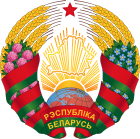|
2025 Belarusian presidential election
Presidential elections are scheduled to be held in Belarus on 26 January 2025 under the terms of the constitution. The president is directly elected to serve a five-year term. BackgroundMass protests erupted following the disputed outcome of the 2020 presidential elections in which incumbent Alexander Lukashenko claimed to have won a sixth term in a landslide. Opposition candidate Sviatlana Tsikhanouskaya subsequently claimed to have received between 60 and 70% of the vote, enough to defeat Lukashenko in a single round, and asked the international community to recognise her as the winner of the election.[1][2][3] On 17 August 2020 Lukashenko stated that the next presidential election could be held earlier than 2025 if a new constitution were to be adopted.[4] Tsikhanouskaya stated that she was ready to lead a transitional government and to hold early elections under international supervision.[5][6] Lukashenko also said that he will resign if a new constitution is adopted.[7] On 15 August 2024 independent media reported (citing BELPOL, an NGO consisting of ex-police and military personnel) that the government was planning to hold the next presidential election on 23 February 2025.[8] On 23 October 2024, the Central Election Commission of Belarus (CEC) announced that the election would be held on 26 January 2025.[9] On 6 November 2024 the Viasna Human Rights Centre reported that Belarusian authorities had started a wave of arrests with over a hundred people detained in a week, many linked to online chats, at a time that Belarusian prisons were already overcrowded.[10] CandidatesOn 25 February 2024, the day of parliamentary elections, Alexander Lukashenko announced his intention to run for a seventh term in 2025.[11] His candidacy, which was submitted by an initiative group, was accepted by the CEC on 29 October. On the same day, the CEC rejected the candidacies of For Freedom movement leader Yuras Hubarevich, citing "violation of the procedure for submitting documents", and Aliaxandar Drazdou.[12] On 4 November, two more candidates were rejected, Diana Kovaleva and Viktor Kulesh, while three other candidates were allowed to begin collecting signatures to support their candidacies, thereby taking the number of candidates with this status to seven.[13] These include Sergei Syrankov of the Communist Party, Oleg Gaidukevich of the Liberal Democratic Party, and former Interior Ministry spokesperson Olga Chеmоdanova.[14] Opinion polls
See alsoReferences
|
|||||||||||||||||||||||||||||||||||||||||||||||||||||||||||||||||||||||||||||||||||||||||||||||||||||||||||||||||||||||||||||||||||||||||||||||||||||||||||||||||||||||||||||||||||||||||||||||||||||||||||||||||||||||||||||||||||||||||||||||||||||||||||||||||||||||||||||||||||||||||
